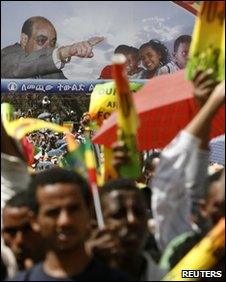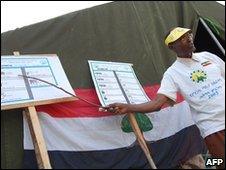EU observers say Ethiopia election 'falls short'
- Published

Mr Meles says he has improved the lives of ordinary Ethiopians
EU observers have criticised Ethiopia's election, as Prime Minister Meles Zenawi held a victory rally attended by tens of thousands of people.
There was an "uneven playing field", said chief EU observer Thijs Berman.
The governing party has won 499 of 536 seats declared but the opposition has complained of vote-rigging.
Violent protests over alleged fraud in the last poll in 2005 left about 200 people dead.
With provisional results announced in all but 11 seats, the Ethiopian People's Revolutionary Democratic Front (EPRDF) is set to massively increase its majority in parliament.
The eight-party Medrek alliance, which had been seen as the main challenger, has only won a single seat - in the capital, Addis Ababa - according to the official results.
At the last polls, the opposition swept the capital, while Medrek had been expecting to perform well in the Oromia region.
"This electoral process falls short of certain international commitments," Mr Berman said, pointing to the use of state resources to campaign for the EPRDF.
US assistant secretary of state for African affairs Johnnie Carson made a similar observation, reports the AFP news agency.
Over the last 18 months, the "government has taken clear and decisive steps that would ensure that it would garner an electoral victory," he said.
Mr Berman praised the elections for being peaceful and well organised but said the EU had received numerous reports of harassment and intimidation which were "of concern".
However, the head of the 170-strong EU team said these shortcomings did not necessarily affect the overall outcome.
Election and government officials have denied the charges of fraud, accusing the opposition of making excuses for its overwhelming defeat.
'Completely fraudulent'
At the rally in Addis Ababa's Meskel Square, supporters of Mr Meles held up placards reading: "We chose our leaders, accept the results" and "Stop second guessing us".

Election officials say the process was above board
"The people's vote will not be overturned by foreign forces," said the prime minister, a US ally against Islamist militants in neighbouring Somalia.
The BBC's Will Ross in Addis Ababa says his message was clearly aimed at international observers and human rights groups who are criticising the way the election was conducted.
But Medrek leader Merera Gudina said his coalition was considering what action to take.
"I don't see any reason why we should accept the results that were completely fraudulent."
Human Rights Watch said in the run-up to last Sunday's vote, people were intimidated and threatened into joining and voting for the EPRDF.
It has also accused the government of not allowing the opposition and independent media to operate freely - charges it strongly denies.
Mr Meles - in power since 1991 - put the expected win down to an impressive track record, especially when it comes to economic growth.
The government has worked hard to improve infrastructure, especially in the urban areas and access to social services like healthcare has increased.
- Published21 May 2010